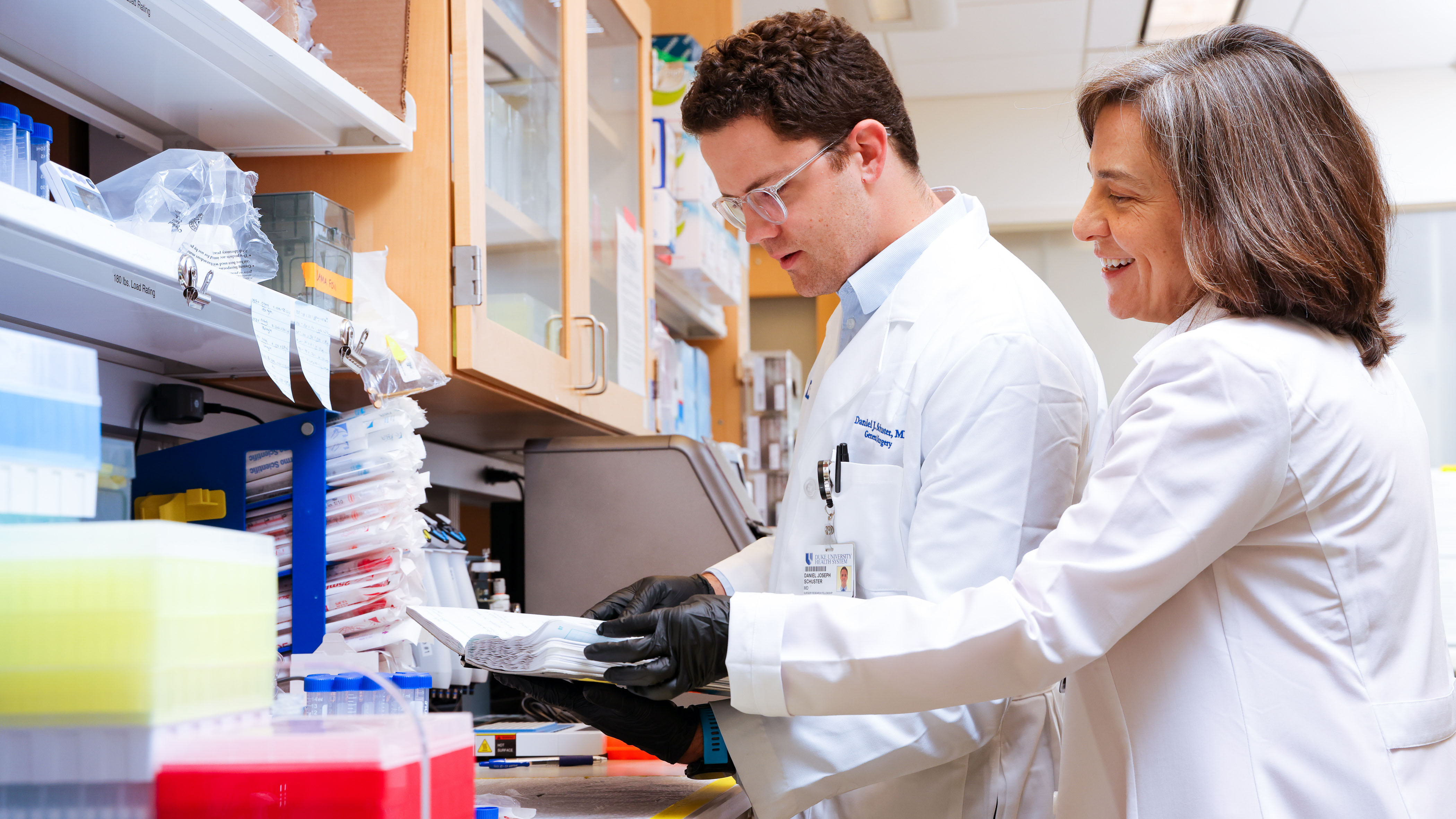Grant Purpose
The purpose of the Advanced Immunobiology Training Program (AITP) at Duke University is to provide surgeons with training in advanced immunology and create surgeon-scientists capable of participating and leading in surgically relevant areas of immunobiological research. The training program will combine the academic rigor of the Duke University School of Medicine with the Duke Department of Surgery’s commitment to training the next generation of surgical researchers. The program is co-directed by an academic surgeon and a basic sciences researcher, each with expertise in immunology. Supplemented by mentors with expertise in basic, translational, and clinical research, this multidisciplinary team is uniquely qualified to merge basic and applied Immunobiology with evolving surgical practice.
Program Faculty and Trainees
Project Investigators

David C. Sabiston, Jr. Distinguished Professor of Surgery
Professor in Pediatrics
Professor in Integrative Immunobiology

A. Geller Distinguished Professor for Research Immunology
Professor in Surgery
Chief, Division of Surgical Sciences
Professor in Molecular Genetics and Microbiology
Professor in Integrative Immunobiology
| Current Trainees | Mentors |
|---|---|
| Abigail Benkert, MD | |
| Victor Moas, MD | |
| Michael Okoreeh, MD |
| Former Trainees | Mentors |
|---|---|
| Aurian Garcia Gonzalez, MD, PhD (2023-2025) | Laurence David, PhD |
| Maria Xu, MD, PhD (2023-2025) | Trudy Oliver, PhD |
| Elishama Kanu, MD (2023-2025) | Daniel Nussbaum, MD Erika Crosby, PhD Peter Allen, MD |
|
Karenia Landa, MD (2019-2020) |
Smita Nair, PhD |
| Alvin (Justin) Rucker, MD, MPH (2020-2022) | Francis Chan, PhD |
| Daniel Schuster, MD (2020-2022) | Georgia Tomaras, PhD |
| Imran Anwar, MD (2021-2022) | Stuart Knechtle, MD |
"When I started surgical residency, I knew I had an interest in thoracic surgical oncology and working in translational immunotherapy research. However, prior to residency, I did not have much experience in this space. Fortunately, I had the opportunity to participate in the Advanced Immunobiology Training Program during the research fellowship portion of my residency program and used that time to obtain a PhD in Immunology.
Through the program, I took numerous courses in Duke’s Department of Immunology that broadened my understanding of basic immunology and experimental design. I was also provided resources to participate in the American Association of Immunologists Introductory Course in Immunology which further covered a broad array of topics in immunology through lectures by international leaders in those fields.
For my bench work, I was afforded mentors, including Dr. Allan D. Kirk and Dr. Kent Weinhold, who helped me design a research proposal for my lab time that helped teach me to plan experiments in a detailed fashion and think through alternative approaches. I also got hands-on training with a variety of techniques relevant to immunology and molecular biology such as flow cytometry and RNAseq.
Upon completion of this training, I feel much better equipped to pursue a career as a surgeon-scientist in the future. As immunology is relevant in so many surgical fields, I think this program is potentially useful for anyone in surgery with an interest in basic or translational research. Given the rigorous and intensive experience this program can provide, this program can be particularly useful for those that have an interest in immunology but limited prior experience in the field."
- Alvin Rucker, MD, MPH, General Surgery Resident
Program Overview
The Advanced Immunobiology Training Program (AITP) is a two-to-three year program that is open only to postdoctoral candidates (MD with/without PhD) who have completed medical school, after two years of clinical training. Research and mentors will be identified within the clinical training years and are usually identified within the intern year of residency.
The program involves mentored research training, protected completely from clinical responsibility upon completion of two years of clinical training. Every resident in General and Thoracic Surgery commits to two years of research, after their second or third year of residency.
Training Overview
- Grand Rounds
- Residents' Surgical Science Seminars
- Journal Clubs
- Lab meetings
- Mentored lab investigation
- Other structured sessions
- Data presentations
- Individual project meetings
- Simulation-based training to maintain technical skills
- Instructor sessions
- Time management and career development sessions
- Present research a minimum of once per semester at Research in Progress meeting (PhD) or Surgical Research Seminars
- Evaluated by executive committee
- Present research at a national meeting
- Evaluate mentorship and program
- Attend and participate in AITP colloquium (EAB also attends)
Trainee Requirements
Trainees are required to complete the following courses and workshops:
- Responsible Conduct of Research Course
- Gopen "Writing from the Reader's Perspective" workshop under sponsorship of Office of Research Support at Duke
- Access Database Bootcamp offered through Duke Human Resources
- Fellows Research Skills and Training Workshop
Trainees are required to participate in didactic studies per training grant core curriculum; trainees will participate in either the non-degree or degree-granting program below:
- Non-degree granting course: Duke University Graduate Program in Immunology
- Degree-granting course: Masters of Health Science in Clinical Research through Duke Clinical Research Training Program
Candidate Selection and Program Completion
The flowchart below illustrates the process of how candidates are identified and selected, and the general timeline and process for when candidates begin and complete the AITP.

Candidates are identified and introduced to mentors prior to beginning their Duke Clinical Residency. During residency, candidates will choose mentors and establish their research plans. After final candidate selection, trainees will suspend their clinical responsibilities to begin research (PGY3/4).
During the program, trainees can enter either the Duke CTRP for MHSc in Clinical Research, or the Duke Immunology PhD program, after which they receive continued mentorship and departmental support for ongoing research through the end of training.
After completion of the AITP (2-3 years), trainees will reintegrate to clinical work with a plan for continuing research
Interested Applicants
Interested applicants should send a letter of interest and curriculum vitae (CV) to Gail Spalsbury (gail.kovachspalsbury@duke.edu) by February 1, 2026 in order to be considered for July 2026 acceptance.
Facilities and Resources
The following facilities, labs, and resources are available to AITP trainees:
Facilities
- Duke School of Medicine
- Duke Department of Surgery
- Duke Transplant Program
- Duke Clinical Research Training Program (CRTP)
- Vertebrate Animal Facilities
- Office of Animal Welfare Assurance
- Immunocompetent Rodent & Biohazard Facility
- Central Vivarium
- Trent Semans Center for Health Education
Labs
- Kirk Laboratory
- Tomaras Laboratory
- Duke Center for Human Systems Immunology (CHSI)
- Mentor laboratories
Resources
- Histology Core Faculty
- Flow Cytometry Core Faculty
- Substrate Services Core
- Duke Immune Profiling Compound (DIPC)
- Duke Center for Human Systems Immunology (CHSI)
- Surgical Education and Activities Lab (SEAL)
- Surgery Training and Animal Research Core (STAR-C)
